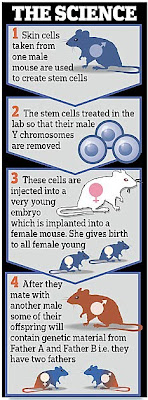 Scientists have created mice with two fathers – raising the possibility of gay couples having children who are genetically their own.
Scientists have created mice with two fathers – raising the possibility of gay couples having children who are genetically their own.In experiments hailed as a ‘new form of mammalian reproduction’, American researchers used a complex series of steps to engineer ‘male eggs’ to be carried by female mice.
The creatures were then mated with normal males – leading to the creation of pups with two fathers.
The geneticists behind the controversial technique said it could potentially be used to improve livestock breeds or preserve endangered species. More provocatively, they claim that if the technique can be refined, ‘someday two men could produce their own genetic sons and daughters’.
But critics say such a scenario would sideline women from the creation of life – and a child’s health and wellbeing should always take precedence over an adult’s desire to be a parent, however strong.
The researchers from the MD Anderson Cancer Centre in Texas started by using a complicated series of steps to create ‘male eggs’.
They began with a male mouse, Father A, and used a sample of his skin to create stem cells – ‘master cells’ capable of turning into many other cell types. They then grew the stem cells over and over in a dish until some naturally lost their male Y chromosome.
These cells, which still had other DNA from Father A, were then injected into young embryos which were carried through pregnancy by surrogate mothers.
The pups that were born were chimeras – organisms consisting of two or more tissues of different genetic composition – and some produced eggs that had only the genetic material from Father A. In other words, they were ‘male eggs’.
The female mice with these ‘male eggs’ were then mated with another male – Father B. This produced babies, some of which were made entirely of genetic material inherited from Father A and Father B.
 American researchers used a complex series of steps to engineer ‘male eggs’ to be carried by female mice (file picture)
American researchers used a complex series of steps to engineer ‘male eggs’ to be carried by female mice (file picture)  Other stem cell experts and ethicists have questioned the need to go through such a complex process to create life.
Other stem cell experts and ethicists have questioned the need to go through such a complex process to create life. Chris Mason, professor of regenerative medicine at University College London, said: ‘One day it may be possible in people, although the technical barriers are far higher than in mice, plus there are major safety issues.
‘The real question, is why would doctors want to use the technique for people? I would be extremely surprised if this scientific discovery had any impact on clinical medicine.’
Josephine Quintavalle, of campaign group Comment on Reproductive Ethics, said: ‘By the scientists’ own admission it was a weird project, but apart from doing it just for the hang of it, there does not seem to be any real justification for the research.
'We should worry when scientists in the area of mammalian reproduction seem to be beyond self-regulation.’
source: dailymail














